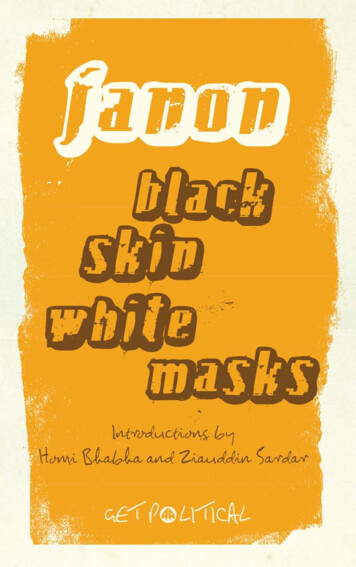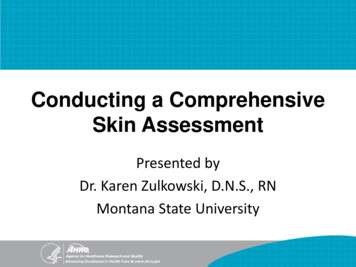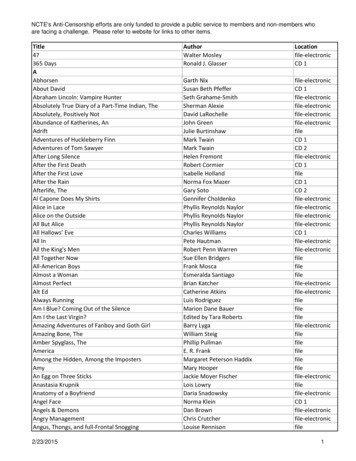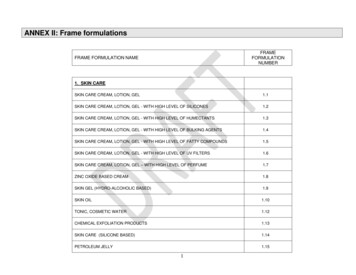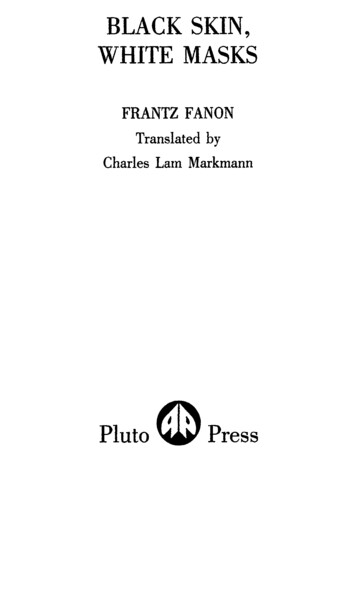
Transcription
BLACK SKIN,WHITE MASKSFRANTZ FANONTranslated byCharles Lam Markmann Pluto . . , Press
First published in 1986 by Pluto Press345 Archway Road. London N6 5AAOriginally published in France asPeau Noire, Masques BlancCopyright 1952 Editions de SeuilTI'anslation Copyright 1967 Grove Press, Inc.A CIP record for this book is available fromthe British LibraryISBN 0 7453 0035 9 pbkImpression 99 98 97 96876Printed in the EC by WSOY, Finland5 4
CONTENTSForeword: Remembering Fanonby Homi BhabhaviiIntroduction9Chapter OneThe Negro and Language17Chapter Two.The Woman of Color and the White Man41Chapter ThreeThe Man of Color and the White \Voman63Chapter FourThe So-Called Dependency Complex ofColonized Peoples83
Chapter FiveThe Fae:t of Blacbess109Chapter SixThe Negro and Psychopathology141Chapter SevenThe Negro and Recognition210Chapter EightBy Way of Conclusion223
;i:FOREWORD: REMEMBERING FANONSelf, Psyche and the Colonial Conditiontf!lo my body, make of me always a man who questions!Black Skin, White MasksIn the popular memory of English socialism the mention ofFrantz Fanon stirs a dim, deceiving echo. BlaokSkin, White T JYr te1! l!:l!i! O:rt"· T!JlOilr:tl. !tfril:a 11e luti m ,- tD§If:. memorable,titles reverberatejJl -- s.elf!igb,teg !.Xh !QriC:: of'reswance'. whenever the English leftgathers, in its narrow church or its Trotskyist camps, tQ. d e lore the immiseration of.!b colon g!LW:QJ'Jg. Repeatedlyused astlie idioms"ofsi.Dlpl moral outrage, F'anon's titlesemptily echo a political spirjtJhat is far fro111 Jiis.own; s 2Ymtthatmpbl 4 l! ience.o a.soclalistYi j9!! that ex . in the main, from an ethnocentric little EnglandiSmtq ,. large Q'1;1qe J,wonJntemationalism. When that labouristllDe of vision is challenged by the 'autonomous' struggles ofthe politics of race and gender, or threatened by problemsof human psychology or cultural representation, it can onlymake an empty gesture of solidarity. Whenever questions ofrace and sexuality make their own organizational and theoretical demands on the primacy of 'class', 'state' and 'party'the language of traditional socialism is quick to describethose urgent, 'other' questions as symptoms of pettybourgeois deviation, signs of the bad faith of socialist intellectuals. Theritual respect accorded to the name of Fanon,:.vii\
viii I Foreword !!!! !l. :, f - ! J!l .!h J Q!llfflQ!l guage QfJ ! l\9QQ, are part of the ceremony of a polite, English refusal.There has been no substantial work on Fanon in the history of the New Left Review; one piece in the New Statesman; one essay in Marxism Today; one article in SocialistRegister; one short book by an English author. Qflate, the P!QO''"off: Qn,has b e11 k P! alive in the tivisttradii: ·i g!J: f !l:gqt},g!!4.Q . by A. Sivanandan's stirring' indictments of state racism. Edward Said, himself a scholar engage, has richly recalled the work ofFanon in his importantT. S. Eliot memorial lectures, Culture and Imperialism.And finally, Stephan Feuchtwang's fine, far-reaching essay,·Fanon's Politics of Culture' (Economy and Society) examines Fanon's concept of culture with its innovatory insights for a non-deterministic political organization of thepsyche. Apart from these exceptions, in Britain todayFanon's ideas are effectively ·out of print'.Memories of Fanon tend to the mythical. He is either rever d-as the prophetic spirit ofThird World Liberation" orrE;y.iled as an exterminating angel, the inspiration to viol,ence in the Black Power movement. .Jpite his hist()pcparticipation in the Algerian revolution and the influence of' h} i eas on the race politics of th and 1970s, F oll'swork will not be possessed by· one political moment ortnovement, not can it be easily placed in a seamless narrativ Qf liberationist history. Fanon refuses to be so completely claimed by events or eventualities. It is the sustaining irony of his work that his severe commitment to the political task in hand, never restricted the restless, inquiringmovement of his thought.It is not for the finitude of philosophical thinking nor forthe finality of a political direction that we tum to Fanon.Heir to the ingenuity and artistry ofToussaint and Senghor,as well as the iconoclasm of Nietzsche, Freud and Sartre,
Foreword I ixt ·;! Fanon is the purvey .r of the transgressive and transitionaliiiith, l{ .ro Y yearltfor the totaft:ransforrriation .f :1li !fi Qciety' .but he speaks most effectiv ly fr: ?m the uncertainiQ! rstices of historical change: .from. the Jn: of ambivaT eJ}, be.tweeni @c ' nd .st! uality; ou.t. of I.ll1I.l s l e(f n t ,ac:!i.ction between ltur and1 lass} f !D ep ! !ll t!t s! 2fpsy !! ic representatio11 and social rea.lity.T : . !a. - St() exp r. 11c the sens pfc:liyi i()(l !h!tprefigures .;:·and fissures- .the emergence of a truly r!:).di thoQghl: that never dawns without casting an uncertain dark.}J;is voic is. inost clearly heard in the subversive turn of afamiliar term, ip. the silence of a sudden mpture: 'The.Negr-0is not. Any more than the white man ' The awkward divisionthat breaks his line of thought keeps alive the dramatic andenigmatic sense of the process of change. That familiaral gnment ofc;olonial subjects- Blac. k/White, Self70ther- isdisturbed with one brief pause al!4 the- traditional groundsof racial identity are dispersed, whenever they aie found toresi.in the narcissistic myths of Negritude or White cultural.s premacy. It is this palpable pressure of division and displacement that pushes Fanon·s writing to the edge ofthings; the cutting edge that reveals no ultimate radiancebut, in his words, 'exposes an utterly naked declivity wherean authentic upheaval can he horn·.'the psychiatric hospital at Blida-Joinville is one such, l ;ewhere, in the divided world of French Algeria, F.anon U.,scovered the impossibility of his mission as a colonial p y ciliiatrist::."'-"If psychiatry is the medical technique that aims to enable manno longer to be a stranger to his environment, I owe it to myselfto affirm that the Arab, permanently an alien in his owncountry. lives in a state of absolute depersonalization . . . Thesocial strudure existing in Algeria was hostile to any attempt toput the individual back where he belonged.
xI ForewordThe extremity of this colonial alienation of the person this end of the 'idea' of the individual- produces a restlessurgency in Fanon's search for a conceptual form ion. "I;he body of hi . work .splits betwee:Q a. Hegeli.an-M }s . !ialecti . a phenomenologi 91 mlatign .ofSelf d,Q.ther a11: IDe psycho Jl h:tic.ambiv eQce of t:tJ. .Yn conscious, its t11rn.ID.g .from love to hate, m.asteryJQ S.!rrY!! ru;-. f;-his de;perat ,-doomed search for a dialectic of deliverance FllnOn.-explores ·-the- edge -.oL.these .modetJortbQqght: hi s J: egeli nism :restgr h()pe to history; 4.! .- x i tentiali t ev()cation of the T restore. the presen e-- o.f !}temarginalized; and his psychoanalytic framework illuminates th "madness'. of ,racism,. the pleasure of pain, Jbeagonistic fantasy of politic l power.As Fanon attempts s\tch audacious, often impossible,transformations of truth and value, the jagged testimony ofcolonial dislocation, its displacement of time and person, itsdefilement of culture and territory, refuses the ambition ofany 'total' theory of colonial opression. The Antilleanevolue cut to the quick by the glancing look of a frightened,confused, White child; Jhe stereotype of the native fi.xeq at.the shifting b tn.n daries between barbarism and civility; theinsatiable fear and desire for the Negro: 'Our women are atthe mercy of Negroes . . . God knows how they makelove';the deep cultural fear of the Black figured in the psychic trembling of Western sexuality- it.is these signs andSYJJlPJQm . Q.[!J:telcolonJa.l concl tiqp th t drive Fanon fromQ nc conceptual scheme to another, while the colonial relation takes shape in the gaps between them, articulated inthe intrepid engagements ofhis style. As.fanon's text un!o.lds, !he · cientific'(act comesJo be aggressed by the exp:. eriep.ce of the street; sociological observations are intercmtwith literacy . artefacts . and the poetry of liberation is
Foreword I xibrough liP, shqr! g :n, t the leaden, deadening PJ:Q g(!!! ,.colonized world . . . Wh t i thi ··distinctive force of Fanon's vision that hasI writ ;b t. a;;"di i lon:'' the disbeen formi g ;; placement, the cutting edge olhis thQught? lt QIIle , I believe, from the tradition of the oppressed, as Walter Benjamin s ggestsi ifii tfielaiig\iage . orad c;olutionary awareness that 'the state of mergency i which we }iv j no(fu ?'ception but the rule. We musfattain to conceptofhistory that is in keeping with this insight.' And the state ofemergency is also always a state of emergence. Thestruggle,.against colonial oppression chang s not only the direction of l iii l)' to(y - l?ut . h Ie11ges. its historicist 'i ( of time .a a progressive, ordered whole. The analysis of colonial e':"personalization alienates not only Hie Enlightenment ideaof' Man', but challenges the transparency of social reality, 8, !a.Qr ::-giyen image of human knowledge. If,Jb Q! l r gfvy stern i tgriCislll.js . tli ! r :· n: ·ffi --cglqp L ! ",of rgency, evf:n. moie.deeply disturbed isJhe - ial.!lDd . .PJ,YgtJ,ic repr esentation of the hutna:n su! Je t. FqrJ e verynature ofl:tumanity becomes estranged. in the oo.loniai oo dWOn and from that 'naked declivity' it emerges, riot a5 anassertion of will nor as an evocation of freedom, but as anenigmatic questioning. With a, qqes on tltat echoes Freud'swhat· does woman want?, Fanon turns to confront the colQnized wodd. 'What does :finan w t?' h . . }R!beintl'oduction to.BlackSkin, White Masks, 'Whatdoes the blackrpan want?'' · ··· ··· . ··.as .aTo this loaded question where. cultural alienation bearsdown on the ambivalence of psychic identification, Fll!.l.QPre onds with an agonizing performance of self-images - ·I ad to meet the white man's eyes. An u familiar weight burdened me. In the white world the man of colour em:ounters
xii I Forewordt:Umculti s in the development ofhis bodily schema . . . bvasbattered down by tom-toms, cannibalism, intelle :tual defici p.cy, fetishism, ractal defects:-. . Hook myselffar offfrom myown presence . . ·. What else cauld it be for me but an amputation, an excision, a haemorrhage that spattered my whole bodyWith black blood?FrQm within the metaphor of vision complicit with aWestern e ph sic of Man emerges the " J p:ment of!he coloma! relabou. Th BlAck presence rums e repre .entative narrative of Western personhood; its past tethered. to treacherous stereotypes of primitivism and degeneracy will.not produce a history of civil progress,""'aspacefor the Socius; its present, dismembered and disloeated.wjJlnot contain the image of identity that is questioned int!le dialectic of mind/body Jllld resolved in the epistemologyqf \ PPe3:r nce reality: . The White man's eyes break upt e Black man's body and in that act of epistemic violence itsown frame of reference is transgressed, it. field of vision disturbed.' 'What does the black man wpnt?' F non insists and inprivileging the psychic dimensioli' e changes not only whatwe understand by a political demand but transforms thevery means by which we recognize and identify its humanagency. F on is not principally posing the question of politic81 oppression as the violation of a human ·essence',although he lapses into uclJ:J!lu,rnent in his more existentialIJlOment. He is not raising the question of colonial man inthe universalist terms of the liberal-humanist ('How doescolonialism deny the Rights of Man?'); nor is he posing an01,1tological question about Man's being ('Who is the alienated colonial man?'). Flll}on's question is not addressed tosq9h a unified notion ()(history nor such a unitary concept ofMan. {t js,. Olle Qf the original and disturbing qualities of.and
Foreword I xiii]!Jgclc. Skip, White '14Cl8 tba.t. it J.: ly h!stQri ize .til 1:"9!\ial. "P . e:D i·. t !! lirrat!y o! ealist.per spective that provide a backgrojlnd ofsocial and'liistoncalfacts against which emerge the problems ofthe indiv- iu.lorcOllective psyche. Spgp J!: ilj.() OC ()l g!cal alignmen Q{,Selfand Society or History and Psyche is.rendered-ques .iionable in Fanon'sidentification of the coloniai subJectwhois histQricized as it romes· tcf be lietf rog n ously. iJ.I cri htJhe texts of history, . i erature, science, myth. The. colooJ;;d subject is ah.vays 'Qverdeiermined ·from \without' fan on writes. lt i ouglt'Jmage, .d{ y- those ordersthat figure transgressively on the borders ofhistory and theunconscious - th. LF ()J! ffi.Q t p of() n l.Y ey ,the C() : onial condition · ·lrt articulating the problem of colonial cultural alienationi . t e J syc ()analytic . l ggag .of fl man'(l Qlld d sjr. Fanon radically questions the formation of both individual d social authority as they come to be developed in the discourse ofSocial Sovereignity. The social virtues of historicalrationality, cultural cohesion, the autonomy of individualconsciousness assume an immediate, utopian identity withthe subjects upon whom they confer a civil status. The civilstate is the ultimate expression of the innate ethical andrational bent of the human mind; the social instinct is theprogressive destiny of human nature, the necessary transition from Nature to Culture. The direct a cess from individual interests to social authority is objectified in the representative structur of a General Will- Law or Culturewhere Psyche and Society mirror each other, transparentlytranslating their difference, without loss, into a historicaltotality. FQLms of social and psychic alien tion and aggr: Si()n - !fiadness, elf-hate, t( on, viql tJ.ce.- c. never be knowle Jged as determinate andconstitutiveeonditions .Qfcivil authority,or as the ambivalent effects of the social in-'. -·-·- .- . ·· :-.- .Y;.,.·:-, ··.· -.
xiv I Forewordstinct itself. Theyar alwaysexplained away as alien presthe ultimate mis- nces, occlusions of histi i:icijl :prqgress,recognition of Man.F.:or Fanon such a myth of Man and Society is fundan:tentally undermined in the colonial. situation here everydaylife exhibits a 'co,nstellation .of-delirium' th t mediates thesocial relations of its subjects: 'Th hNegro. enslavedpy his inferiority, the white man enslaved by his superiorityalike behave in ac rdance with a neurotic orientation.'f!Plon' s demand for a psychoanalytic explanation emergesfr9m the perverse reflections.of 'civil virtue' in the alienati g acts of co.l()n aJ governance: the visibility of cultural'mummification' in the colonizer"'s avowed ambition tocivilize or modernize the ·native which results in. 'archaicinert instibltions[that functionfunder the oppressor's supervision like a caricature of formerly fertile institutions'; ortb. validity of violence in the very definition of the colonialsocial space; or the viability of the febrile, fantasmatic i!!lages of racial hatred that come to be absor ed and acted outip ·the wisdom of the West. The:i jnterpositions, h1deedcpll borations ()f political and psychic violence within civicvirtue, alienation within identity, dtive Fanon 'to describethe splitting of the colonial space of consciousness andsaciety as marked by a1'Manichean delirium't· T !'!f prese.ntative figure of such a perversio , r p ,. 9.sJ ggest, is the image of post-Enlightenment man tetl1eredt9; not confronted by, his dark reflection, the shadow ofcolonized manl that splits his prestmce, distorts his outline,breaches his boundaries, repeats his action at a distance,disturbs and divides the very time ofhis being. T.his ambivalent identification of the racist world- moving on two planeswithout being in the least embarrassed by it, t spf.the anti,.Semitic consciousness--- - turns on the idea of Manas his alienated iinage, notSelfandOther but tl1e'Other-::"·. .·.·-·iormal'··· ,,. . ·. .,., .-- .' --'. .,.:.,·----- '
Foreword I xvness' of the Self inscribed in the perverse palimpsest of colQnial identity. And it is that bizarre figure of desire, whichsplits along the axis on which it turns, that compels Fanon toput the psychoanalytic question of the desire of the subjectto the historic condition of colonial man.'What is often called the black soul is a white man'sartefact,' Fanon writes. This transference, I've argued,speaks otherwise. It reveals the deep psychic uncertainty ofthe colonial relation itself; its split· representations stagethat division of'body' and 'soul' which enacts the artifice of'identity'; a division which cuts across the fragile skin black and white - of individual and social authority. Whatemerges from the figurative language I have used to makesuch an argument, are three conditions- that underlie an understanding of the process ofidentification in the analytic ofdesire.First: tg f:'xist is to be called in () ,bemgjn relation to Qtberness, it s look or locus. It is a demand that reaches out Ward to an external object and as J. Rose\writes, 'it is therelation of this demand to the place of the object it claims-that becomes the basis for identification'. Th s process . i V!s bl in that exchange oflooks betwe n native and ettJ rU.atstrucf1Jres their psychic r lationin the paranoid fantasyof boundless possession and its familiar language of reversal:-'when theil' glances meet he [the settler] ascertains J) tterly,8Iways on the defensive, "They want to take our place." It istrue for there is no native who does not dream at least once aday of setting himself up in the settler's place. 'It is always inrelation to the place of the Other that colonial desire is arti t, llil.!ed: thlil.t i . in part, the fantasmatic space of'possessign'tJ:tat no one subject can singly occupy which permits thedream of the inversion of roles.\.§ nd the vecy place of identification, caught in the tension-of demaiia and desire, is a space of splitting. 'The ran:.1--.\:·f·::·· J. , \.;-(·-.
%ViI Forewordt!s ,y Q[thenative .is precisely to occupy the master's plaeewhile keeping his place ill the slave's avenging anger. 'Black!!Wls .vYhite masks' is not, f r example, a neat division; it is adoubling, dissembling image of being in at least two places; ai: once which makes it impossible for the devalued, insatii able evolue (an abandonment neurotic, Fanon claims) to accept the colonizer's invitation to identity: 'You're a doctor, awriter, a student, you're d#ferentyou're one of us.' Jtj precis.ely in that ambivale11t U e oftdifferent' - to be differentfrom those that are different makes you the same- UPf.Unconscious speaks of the form of Qthernes . t&e t til reCIs}ladow of deferral and displaCement. It is not the Colonialist Self or the Colonized Other, bpt tile disturbing dis ce i -betwetm that constitutes the figure of colonialotheme s - the White man's artifice inscribed on the black a1n s b dy.[lt is in relation to this impossible object thate:merges the liminal problem of colonial identity and its.vicissitudes]Finally, as has already been disclosed by the rhetoricalfigures of my account of desire and Otherness, tQ questionofidentification is never the affirmation of a pre-given identity, never a self-fulfilling prophecy - t is always the prod""uction'of an 'image' of identity and the transformation of thesubject in assuming that image. Tbe demand of identifica.(i !ll- that is, to be for an Other- enW}s the representationrtf the subject in the differentiating order of Otherness.Identification, as we inferred from the illustrations above, isaLways th , Jl,;n . { n. image of identity which bears themark of s lilting ih' th t 'Other' place from which it comes.For Fanon, li e Lacan, the·. primary moments of such a re. petition of the self lie in the desire of the look and the limitsQflanguage.'atmosphere of certain uncertainty' thatsurrounds the body certifies its existence and threatens itsdismemberment .The. : :. -., .-. ··- '· .·.·.-
Foreword I xviiLook a Negro . Mama, see the Negro! I'm frightened . Icould no longer laugh, because I already know there were legends, stories, history ancl above all historic-ity . . . Thenassailed at various points, the corporal schema crumbled itsplace taken by a racial epidermal schema. . . Itwasn()longeraquestion of being aware of my body in the third l}ersoll but in atriple person . . . lwas responsible for my ,f9f!PX.rA ' t'for my ancestors. '··.· ·.· ·· · ·l.RJ: ding, lac Skin,til difference betweenWhite Masks it is crucial to respect.·personal'i e tiiy':a an)ntimati no.f.reality, or a.n intuition of being, and the psychoanai}'iicp oblem of identification that, in a sense, always begs thequestion of the subject- 'What'doe a man \V'clnt?',The emergence of the human subject as socially and psychicallyauthenticated depends upon \the negation, of an origb.iarynarrative offulfilment or an imaginary coincidence betweenindividual interest or instinct and the General Will. Suchbinary, two-part, id ntities functi in a kind of narcis iSticreflection of the One in the Other which is confronted in thelanguage of desire by the psychoanalytic process of identi6 atioq, . :t: r identification, identity is never an a priori, qora finished product; it is only ever the problematic process ofaccess to an 'image' of totality. The discursive conditions ofthis psychic image of identification will he clarified if wethink of the perilous perspective of the c.:oncept of the imageitself. ·,For the image,. as point of identification- marks thesite of an ambivalence. Its representation is always -spatiiillysplit - it makes present something that is absent -l!nd temporally deferred - it is the representation of a time that isalways elsewhere, a repetition. The image is only ever anappurtenance to authority and identity; it must never beread mimetically as the ·appearance' of a 'reality'. The ac ess to the image of identity is only ever .possible--in .tlitineg: ·flfjora of any sense oforigin UY. or plenitude., th.r mgh the.
xviii I Forewordprinciple of displacement and differentiation (apsence/representatioD/r petition) that always renders it af(Jijfu i if:Y. 'Tlie image is at once a metaphoric substitutt()n, an illusion of presence and by that same token a metonym; a, ign of its absem.-e and loss. It is precisely from this dge of meaning and being, from this shifting boundary or-·(e thsrne s within i, nt, ty that Fanon asks:. · t does ablack man want?''. ' .presence;When it encounters resistance from the other, selft.'Onsciousness undergoes the experience of desire . . . Assoon as I desire I a. k to be considered. I am not merely here andnow, sealed into thingness. I am for somewhere else and forsomething else. I demand that notk-e be taken of my negatingactivity in so far as I pursue something other than life . . .I oc'Cupied space. I moved towards the other . . . and theevanescent other, hostile but not opaque, transparent, notthere, disappeared. Nausea.[ From that overwhelming emptiness of nausea -Fanonirpa,kes his answer: the black man wants the objectifying confrontation wi ,9 ffi s; t the .'Ol n- psyche tl.it::r: isJllluncQ sciou ll vow ili iiegating, sp!itt.ing moment ofd sire. The plcice ofthe Oilier must not be imaged as Fanon, s,pmetimes suggests as a fixed phenomenological point,' posed to the self, that. represents a culturally alien :9n·sciousness. The Other must be seen as the necessarynegation of a primordialidentity - cultural or psychic - thatintroduces the system of differentiation which enables the'2ultural' o be signified as a linguistic,. symbolic, ll,istoncre.ality. as i have suggested, the subject of desire is never Jmply a yself, then the Other"is never simply an It-self, a'f nt of id mtity, truth, or misre .'Ognition.- i' - - .: .,:, -As a principle of identification, the Other oestbws a degree of objectivity but its representation - he it the social·oru:
process of the Law or the psychic process of the Oedipus- isalways ambivalent, disclosing a lack. For instance, thecommon, conversational distinction between 'the letter andspirit' of the Law displays the otherness of Law itself; theambiguous grey area between 'Justice' and judicial procedure is, quite literally, a conflict ofjudgement. In the language of psychoanalysis, the Law of the Father or the paternalmetaphor, again, cannot be taken at its word. It is a processof substitution and exchange that inscribes a normative,normalizing place for the subject; but that metaphoric access to identity is exactly the place of prohibition and repression, precisely a conflict of authority. Identification, asit is spoken in the desire ofthe Other, is, always a qu,estion ofipterpretation for it is the elusive assignation of myself witPa one-self, th elision of person and place.,, lfthe diffe.rentiating force of the Other is the process ofthe stlbject's signification in language and society's objectification in Law, then h w can the Other disapp ii.t? Q n.desire, the moving spirit otlhe subject ever, eyanesce?' ' '' 'In his more analytic mode Fanon c;!an impede the exploration of these ambivalent, uncertain questions of colonial desire. The state of emergency from which he writes demandsmore insurgent answers, more immediate identifications.At times Fanon attempts too close a correspondence between the mise-en-scene of unconscious fantasy and thephantoms of racist fear and hate that stalk the coloniall cene;he turns too hastily from the ambivalences of identificationto the antagonistic identities of political alienation and cultural discrimination; he is too quick to name the Other, topersonalize its presence in th ! language of colonial racism - ·'th real Other for the white IJl n is and will conijnue to bt , h, .blackme1n,, And conversely.' These attempts, in Fanon'swords, to restore the dream to its proper political time andcultural space, can, at times, blunt the edge of Fanon' s bril-
xr I Forewordliant illustrations of the complexity of psychic projections inthe pathological colonial relation. Jean Veneu e, the Ant- .ill an evolue, desires not merely tS'be ill the place ofthe · Itii. man but· compulsively seeks to look back and dqwnon himself from. that position·. The .White. man does notigpreiy deny what he fears and desires. by projecting it on"!hem:; Fanon sometimes forgets that paranoia never pre erves its p9sition of power for the compulsive identificationwitlt a persecutory (fhey is. alw ys an evacuation and emptYfng of the'T. ·. . .Fanon·s sociodiagnostic psychiatry tends to explain awaytlte ambivalent turns and returns of the subject of 9lonialdesire, its masquerade· of Western Man an.d the "long' his'torical perspective. Itjs as if Fanon is fearful of his mostradical insights: th t the space of the body and its identifica·. tion is a representational reality; that the politics of race willnot be entirely contained within the humanist myth of manor economic necessity or historical progress, for its psychicairects questions such forms of determinism; that social sove ignJty and human subjectivity are QI)ly realizable in theorder of Otherness. It is as if the question of desire that emerged from the traumatic tradition of the oppressed has tohe denied, aUhe end of Black Skin, White Masks, to make ay for an existentialist humanism that is as banal as it isbeatific:Why not the quite simple attempt to touch the other to feel theother, to explain the other to myself?. . . A the conclusion ofthis study, I want the world to re .'Ognize, With me, the open. .door of eveey (.'Onsciousness.·ISuch a deep hunger for humanism, despite Fanon's ins!!ht into the dark side of Man, must be 3n QYercomp e.n tion for the closed consciousness or "dual narcissism' tcJ
Foreword I xxiwhichhe attributes the .depersonalhation of. colonialma.n:.'There one lies body to h , dy, with one's Wa. kn ss or one's tiUeness in full narcissistic cry, each s ti"into his.ownl'art culari y- with, it is true, now and then a flash or so.' Itis this flash of 'recognition' - in its Hegelian sense with itstranscendental, sublative spirit - that fails to ignite in thecolonial relation where there is only narcissistic indifference:'And yet the Negro knows there is a difference. He wants it. . . T former slave needs a challenge to his humanity'.I !he absence of such a challenge, F.anon argues, the c , l:Q9-i:zed (!an only imitate, Qeyer identify, a distinction nicelyJtlade by the psychoanalyst Annie Reic'h:.·is imitation. . . when the child holds the newspaper like his r: It identification when the child learns to read.' In dt.savowi'lig 1the cu,lturally differentiated condition of the colonial world-in demanding 'Turn White or disappear'- th colonizer Ishimself caught in the ambivalence of paranoic identification, alternating between fantasies of megalomania and per·.iecution.H9wever Fanon's Hegelian dream for a human .reality init elf-for itself is ironized, eyen mocked, by },lisview of theManichean structure of colonial consciousness and its nondialectical division. What he says in\Thf Yfret ht!d oft Earthlof the dembgraphy of the colonial city reflects hisy ew of the psychic structure of the colonial relation. Tl,tell!J.tjye and settler zones, like the juxtaposition of black and .white bodies, are opposed, but not in the service of"a higherunity'. No concilation is possible, he concludes, for of the· . -" · ·-· ·two teniis.on i periluoy : ····· ··m- · · ·· ·······n. -··· ::N .J!!Eii · an e m -J:er;Qnciliatto.n. ne.ff. g I! !l-· - -9 ! !!P,.n:. n s il !lpJ s mtj!D ntalpromis tof!lhum nJ.§t g : qdd, ?Ohe.Jou.' an there be·life without trans ndence? Politics. with
thoQghl: that never dawns without casting an uncertain dark. }J;is voic is. inost clearly heard in the subversive turn of a familiar term, ip. the silence of a sudden mpture: 'The.Negr-0 is not. Any more than the white man ' The awkward division that breaks his line of thought keeps alive t
